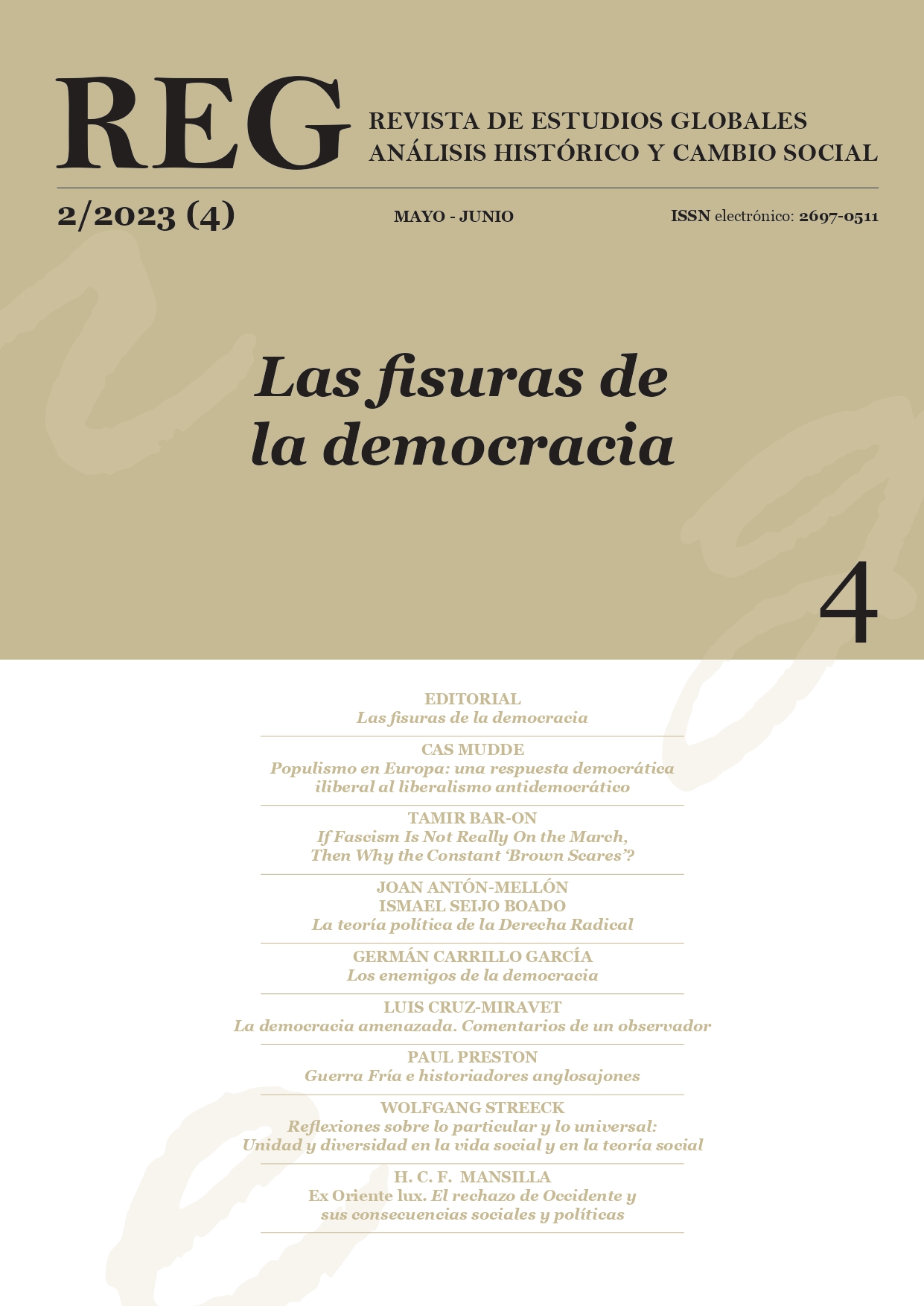La teoría política de la derecha radical
Resumen
El presente artículo tiene como objetivo explicitar la teoría política de la derecha radical contemporánea. Para ello, se estudiarán sus ideas-fuerza y cómo han sido teóricamente conceptualizada por sus referentes culturales. En primer lugar, se sitúa a la derecha radical dentro del marco de la ultraderecha, entendiendo sus diferencias con la extrema derecha y mostrando su heterogeneidad interna. Después, se atienden a los referentes culturales que han configurado la teoría política de la derecha radical, concretamente a cuatro corrientes: la Nueva Derecha Europea (ND) de Benoist y Faye (como principal matriz ideológica de la derecha radical), el neotradicionalismo de Evola y Dugin, la alt-right de Bannon y el conservadurismo radicalizado de Scruton y Olavo de Carvalho. Finalmente, se describe la teoría política de la derecha radical marcada por un diagnóstico decadentista de la sociedad, unos objetivos etnonacionalistas y unos medios metapolíticos y reformistas.
Descargas
Métricas
-
Resumen965
-
pdf3333
Citas
Abascal, S. (2017). Prólogo. En R. Scruton, Filosofía verde. Cómo reflexionar seriamente sobre el planeta (pp.9-13). Homo Legens.
Alejo, A. (2018). Make America Great Again: ¿expresión de un nativismo blanco contemporáneo?. Revista CIDOB d’Afers Internacionals, 119, 185-207. https://doi.org/10.24241/rcai.2018.119.2.185
Alexander, J. C. (2018). Raging against the enlightment: the ideology of Steve Bannon. En J. L. Mast & C. J. Alexander (Eds.), Politics of Meaning/Meaning of Politics (pp. 137-148). Palgrave MacMillan. https://doi.org/10.1007/978-3-319-95945-0_8
Anderson, P. (2012). El nuevo viejo mundo. Akal.
Antón-Mellón, J. (2002). El neopopulismo en Europa Occidental: parámetros doctrinales y esquemas ideológicos. En J. Antón-Mellón (coord.), Orden, jerarquía y comunidad. Fascismos, dictaduras y postfascismos en la Europa contemporánea (pp. 277-301). Tecnos.
Antón-Mellón, J. (2007). Julius Evola (1898-1974). Ideólogo de la derecha radical europea contemporánea. En M. Á. Simón Gómez (Ed.), La extrema derecha en Europa desde 1945 hasta nuestros días (pp. 205-222). Tecnos.
Antón-Mellón, J. (2011). El eterno retorno. ¿Son fascistas las ideas-fuerza de la Nueva Derecha Europea (ND)?. Foro Interno, 11, 69-92. https://doi.org/10.5209/rev_FOIN.2011.v11.37009
Antón-Mellón, J. (2012). La sangre vale más que el oro. ¿Son fascistas las ideas-fuerza de la Nueva Derecha Europa?. En J. Antón-Mellón (Coord.), El fascismo clásico (1919-1945) y sus epígonos (pp. 237-262). Tecnos.
Bar-On, T. (2001). The ambiguities of the Nouvelle Droite, 1968-1999. The European Legacy, 6(3), 333-351. https://doi.org/10.1080/10848770120051349
Bar-On, T. (2013). Fascism to the Nouvelle Droite. The quest for pan-European empire. En A. Mammone, E. Godin & B. Jenkins (Eds.), Varieties of right-wing extremism in Europe (pp. 69-84). Routledge.
Benoist, A. (2020). Contra el liberalismo. Ediciones Insólitas.
Benoist, A. (2022, 3 de septiembre). Alain de Benoist: “El eurasismo de Dugin es incompatible con el nacionalismo”. Extramuros. Recuperado de: https://extramurosrevista.com/alain-de-benoist-el-eurasismo-de-dugin-es-incompatible-con-el-nacionalismo/?utm_source=rss&utm_medium=rss&utm_campaign=alain-de-benoist-el-eurasismo-de-dugin-es-incompatible-con-el-nacionalismo
Benoist, A. (s.a.). El error del liberalismo. Elementos de Metapolítica para una Civilización Europea, 28: Contra el liberalismo. El principal enemigo, 26-29. Recuperado de:
Benoist, A. (s.a.). Antonio Gramsci, marxista independiente. Elementos de Metapolítica para una Civilización Europea, 40: Antonio Gramsci y el poder cultural. Por un gramscismo de derecha, 4-8. Recuperado de:
Benoist, A. (s.a.). Identidad y diferencia. Elementos de Metapolítica para una Civilización Europea, 47: Elogio de la diferencia. Diferencialismo versus racismo, 3-10. Recuperado de: https://archive.org/details/elementos_201907/47.%20%20Elementos%20ELOGIO%20DE%20LA%20DIFERENCIA-DIFERENCIALISMO%20versus%20RACISMO/page/n1/mode/2up
Benoist, A., y Faye, G. (1986). Las ideas de la Nueva Derecha: una respuesta al colonialismo cultural. Ediciones de Nuevo Arte Thor.
Betz, H. G. (1994). Radical right-wing populism in Western Europe. Macmillan.
Betz, H. G. (2017). El nativismo y el éxito de la movilización populista. Revista Internacional de Pensamiento Político, 12, 169-188. http://hdl.handle.net/10272/14960
Betz, H. G. (2021). Forty years of radical right-wing populism: an assessment. En G. Pereyra Doval & G. Souroujon (Eds.), Global resurgence of the right. Conceptual and regional perspectives. Routledge.
Bihr, A. (1999). L’actualité d’un archaïsme. La pensée d’extrême droite et la crise de la modernité. Editions Page deux.
Bonefeld, W. (2015). Crisis, free economy and strong State: on ordoliberalism. European Review of International Studies, 2(3), 5-14. https://doi.org/10.1080/13563467.2012.656082
Bonnett, K., Bromley, S., Jessop, B., y Ling, T. (1984). Authoritarian Populism, Two Nations, and Thatcherism. New Left Review, 147, 32-60.
Burgos, R. (2019). La derecha y Gramsci: demonización y disputa de la teoría de la hegemonía. En Gramsci. La teoría de la hegemonía y las transformaciones recientes en América Latina (pp. 145-187). Actas del Simposio Internacional de Asunción, Centro de Estudios y Educación Popular Germinal, Asunción, Paraguay.
Burke, E. (1984). Reflexiones sobre la Revolución Francesa. En E. Burke, Textos Políticos (pp. 41-258). Fondo de Cultura Económica.
Carvalho, O. (21 de septiembre de 2011). Até que enfim. Olavo de Carvalho Website Oficial. Recuperado de: https://olavodecarvalho.org/ate-que-enfim/
Dugin, A. (s.a.). Metafísica del nacional-bolchevismo. Elementos de Metapolítica para una Civilización Europea, 8: Ernst Niekisch y el nacional-bolchevismo, 44-57. Recuperado de:
https://archive.org/details/elementos_201907/08.%20ELEMENTOS%20ernst%20niekisch/mode/2up
Dugin, A., y Carvalho, O. (2012). Os EUA e a nova ordem mundial. Um debate entre Alexandre Dugin e Olavo de Carvalho. Vide Editorial.
Eatwell, R. (2004). Introduction: the new extreme right challenge. En R. Eatwell & C. Mudde (Ed.), Western democracies and the new extreme right challenge (pp. 1-16). Routledge.
Eatwell, R., y Goodwin, M. (2019). Nacionalpopulismo. Por qué está triunfando y de qué forma es un reto para la democracia. Ediciones Península.
Evola, J. (1984). Les hommes au milieu des ruines. Pardès.
Evola, J. (1987). Cabalgar el tigre. Ediciones de Nuevo Arte Thor.
Faye, G. (2017). El arqueofuturismo. Recuperado de:
https://kupdf.net/download/guillaume-faye-el-arqueofuturismopdf_59d031fa08bbc5476268704a_pdf
Faye, G. (s.a.). La colonización de Europa. Reconquista: ¿una sinfonía española?. Elementos de Metapolítica para una Civilización Europea, 9: Europa y el islam. El fracaso del multiculturalismo, 3-5. Recuperado de:
https://archive.org/details/elementos_201907/09.%20ELEMENTOS%20EU%20y%20el%20Islam/page/n1/mode/2up
Ferraresi, F. (1987). Julius Evola: tradition, reaction and the Radical Right. European Journal of Sociology, 28(1), 107-151. https://doi.org/10.1017/S0003975600005415
Forti, S. (2021). Extrema derecha 2.0. Qué es y cómo combatirla. Siglo XXI Editores.
Gellner, E. (2001). Naciones y nacionalismos. Alianza Editorial.
Gentile, E. (2002). El Fascismo italiano. En J. Antón-Mellón (coord.), Orden, jerarquía y comunidad. Fascismos, dictaduras y postfascismos en la Europa contemporánea (pp. 77-102). Tecnos.
Griffin, R. (2007). Plus ça change! El pedigrí fascista de la Nueva Derecha. En M. Á. Simón Gómez (Ed.), La extrema derecha en Europa desde 1945 a nuestros días (pp. 67-103). Tecnos.
Griffin, R. (2019). Fascismo. Alianza Editorial.
Griffiths, R. (Ed.). (2019). The rise of populism. Stephen K. Bannon vs. David Frum. The Munk Debates. House of Anansi Press.
Hall, S. (1980). Popular-Democratic vs Authoritarian Populism. En A. Hunt (Ed.), Marxism and Democracy (pp. 157-180). Lawrence & Wishart.
Hernández-Carr, A. (2011). La derecha radical populista en Europa: discurso, electorado y explicaciones. Revista Española de Investigaciones Sociológicas, 136, 141-160. https://www.ingentaconnect.com/contentone/cis/reis/2011/00000136/00000001/art00007?crawler=true&mimetype=application/pdf
Ignazi, P. (1992). The silent counter-revolution: Hypothesis on the emergence of extreme right-wing parties in Europe. European Journal of Political Research, 22, 3-34. https://doi.org/10.1111/j.1475-6765.1992.tb00303.x
Jara Townsend, G. (2020). Una antigua y nueva derecha: Dugin y Fusaro. Antagonismos, 1(1), 161-196.
Lerín Ibarra, D. (2019). La nueva derecha radical como reto a la gobernanza y a la calidad de la democracia. Cuadernos de Gobierno y Administración Pública, 6(2), 93-116. https://doi.org/10.5209/cgap.65912
Meilán Pena, Y. (2022). El neopaganismo en Alain de Benoist: análisis de una reestructuración ideológica de la derecha radical europea. Política y Sociedad, 60(1), 1-12. https://dx.doi.org/10.5209/poso.79050
Meloni, G. (2021). Io sono Giorgia. Le mie radici, le mie idee. Rizzoli Libri.
Molas, B. (2022). ‹‹Con suerte, llegará el día de Nietzsche››: las raíces iliberales de la Alt-Right. Revosta CIDOB d’Afers Internacionals, 132, 73-92. https://doi.org/10.24241/rcai.2022.132.3.71
Mudde, C. (2000). The ideology of the extreme right. Manchester University Press.
Mudde, C. (2007). Populist Radical Right Parties in Europe. Cambridge University Press.
Norris, P. (2005). Radical Right. Voters and Parties in the Electoral Market. Cambridge University Press.
Norris, P., e Inglehart, R. (2019). Cultural Backlash. Trump, Brexit and Authoritarian Populism. Cambridge University Press.
Paxton, R. O. (2019). Anatomía del fascismo. Capitán Swing.
Poulantzas, N. (2016). Estado, poder y socialismo. Siglo XXI Editores.
Ramas San Miguel, C. (2019). Social-identitarios y neoliberales autoritarios: dos corrientes en la nueva Internacional Reaccionaria. En A. Guamán, A. Aragoneses y S. Martín (dirs.), Neofascismo. La bestia neoliberal (pp.73-87). Siglo XXI Editores.
Reguera Mateo, M. (2017). La ideología de la Alt Right: Orígenes, pensadores e ideas de la nueva extrema derecha estadounidense. En La Fortaleza de Europa: vallas y puentes. XIII Congreso de la Asociación Española de Ciencia Política y de la Administración, Santiago de Compostela, España. https://aecpa.es/files/view/pdf/congress-papers/13-0/1462/
Rocha-Vasconcelos, F. T. (2021). A “guerra cultural” neofascista no Brasil: entre o neoliberalismo e o nacional-bolchevismo. Morrinhos, 10(2), 1-28. https://www.revista.ueg.br/index.php/revistahistoria/article/view/11549/8420
Rodríguez Jiménez, J. L. (2006). De la vieja a la nueva extrema derecha (pasando por la fascinación por el fascismo). Historia Actual Online, 9, 87-99. https://doi.org/10.36132/hao.v0i9.138
Rueda Toledano, D. (2021). Los fundamentos ideológicos de la Alt-Right: del paleoconservadurismo a la fascistización. Encrucijadas, 21(2), 1-28. https://recyt.fecyt.es/index.php/encrucijadas/article/view/81470
Rydgren, J. (2017). Radical right-wing parties in Europe. What’s populism got to do with it?. Journal of Languages and Politics, 16(4), 485-496. https://doi.org/10.1075/jlp.17024.ryd
Rydgren, J. (2018). The radical right. An introduction. In J. Rydgren (Ed.), The Oxford Handbook of the Radical Right (pp. 23-35). Oxford University Press.
Sanromán, D. L. (2008). La Nueva Derecha. Cuarenta años de agitación metapolítica. Centro de Investigaciones Sociológicas.
Scruton, R. (2018). Cómo ser conservador. Homo Legens.
Sheehan, T. (1981). Myth and violence: the fascism of Julius Evola y Alain de Benoist. Social Research, 48(1), 45-73.
Shekhovtsov, A. (2015). Alexander Dugin and the West European New Right, 1989-1994. En M. Laruelle (Ed.), Eurasianism and the European Far Right: Reshaping the Europe-Russia Relationship (pp.35-53). Lexington Books.
Simón Gómez, M. Á. (2007). El decadentismo en la derecha radical contemporánea. Política y Sociedad, 44(1), 175-198.
https://revistas.ucm.es/index.php/POSO/article/view/POSO0707130175A/22402
Smith, A. D. (2010). Nationalism. Theory, Ideology, History. Polity.
Spektorowski, A. (2003). The New Right: Ethno-regionalism, ethno-pluralism and the emergence of a neo-fascist ‘Third Way’. Journal of Political Ideologies, 8(1), 111-130. https://doi.org/10.1080/13569310306084
Taguieff, P. A. (1993). From race to culture: The New Right’s view of European identity. Telos, 1993(98-99), 99-125. https://doi.org/10.3817/0393099099
Taylor, B. (2021). Alt-Right. En Z. A. Casey (Ed.), Encyclopedia of Critical Whiteness Studies in Education (pp. 15-22). Brill. https://doi.org/10.1163/9789004444836_003
Taylor, J. (2016, October 11). What is the Alt Right?. American Renaissance. Recuperado de: https://www.amren.com/news/2016/10/what-is-the-alt-right-jared-taylor/
Tévanian, P., y Tissot, S. (2002). Dictionaire de la Lépenisation dels esprits. L’Esprit Frappeur.
Traverso, E. (2018). Las nuevas caras de la derecha. Siglo XXI Editores.
Von Beyme, K. (1988). Right-wing extremism in post-war Europe. West European Politics, 11(2), 1-18. https://doi.org/10.1080/01402388808424678
Wood, N. (1978). The social history of political theory. Political Theory, 6(3), 345-367. https://doi.org/10.1177/009059177800600306
Zakaria, F. (1997). The Rise of Illiberal Democracy. Foreign Affairs, 76(6), 22-43. https://doi.org/10.2307/20048274
Derechos de autor 2023 Revista de Estudios Globales. Análisis Histórico y Cambio Social

Esta obra está bajo una licencia internacional Creative Commons Atribución-NoComercial-SinDerivadas 4.0.










